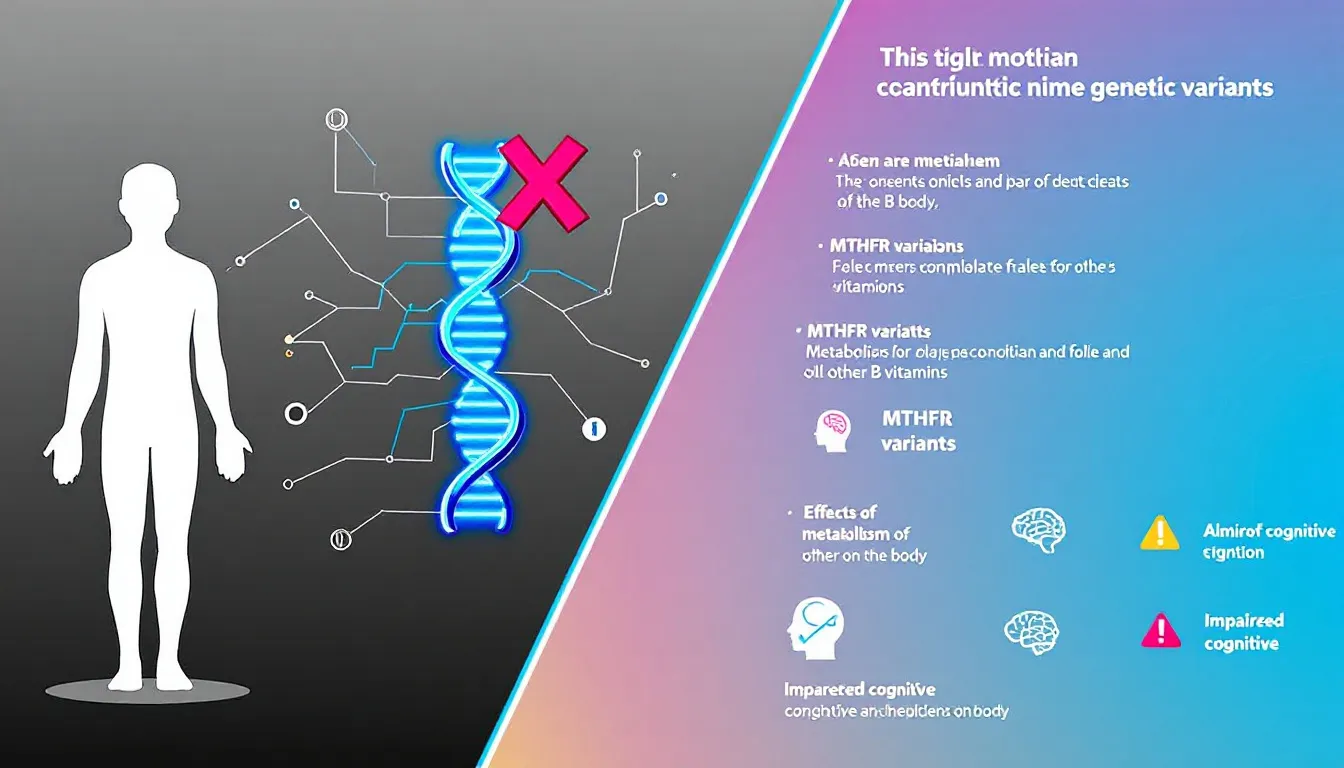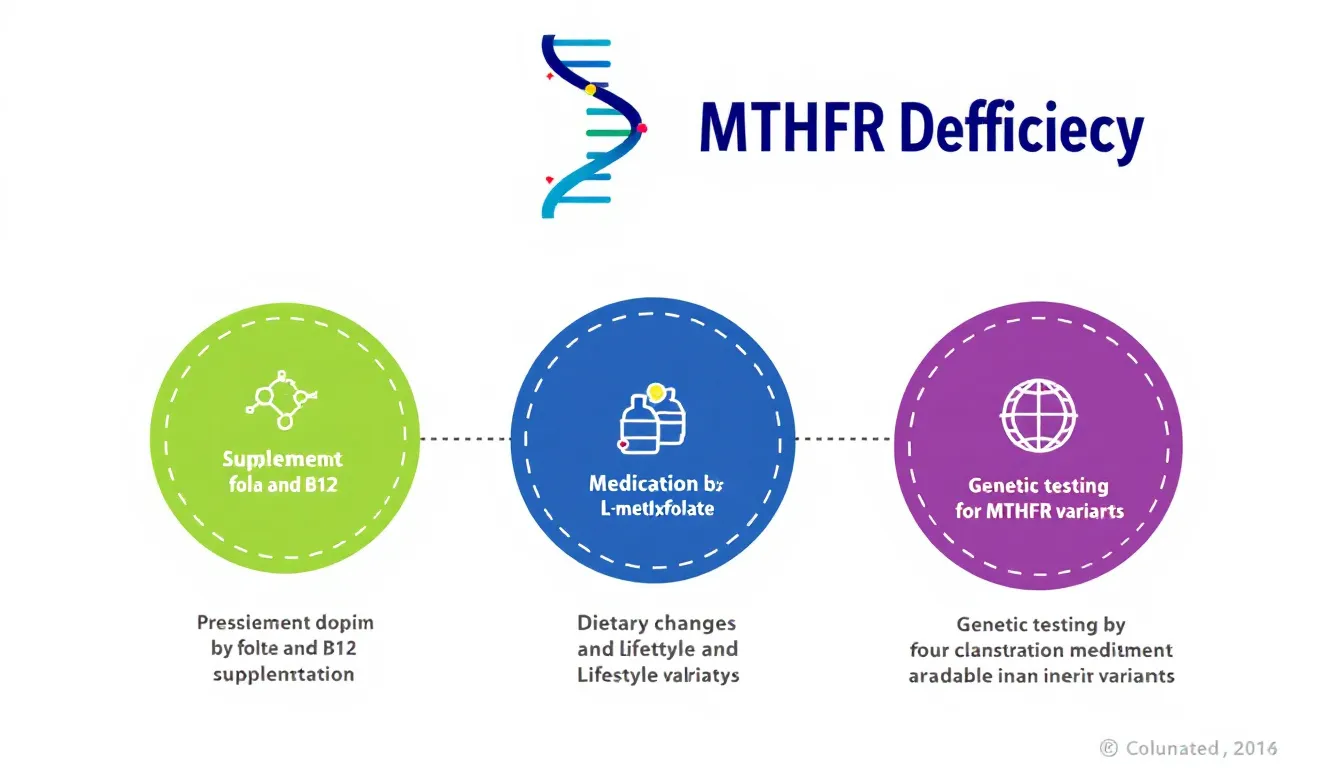Are you looking for an MTHFR Dr. to help you manage your gene mutation? Consulting an MTHFR specialist is crucial for personalized treatment and health management. This article covers what the MTHFR gene is, its common variants, how it affects health, and how an MTHFR doctor can provide tailored care.
Key Takeaways
The MTHFR gene is crucial for processing folate, and its variants, particularly C677T and A1298C, significantly affect health and folate metabolism.
Consulting an MTHFR specialist provides tailored treatments and lifestyle changes, essential for managing the health impacts associated with gene mutations.
Dietary choices and supplementation, especially with natural folates, are vital in managing MTHFR mutations, while genetic testing enables proactive health risk management.
What is the MTHFR Gene?

The MTHFR gene provides instructions to create the MTHFR protein, which process folate (vitamin B9) into its active form, essential for DNA synthesis and repair. Methylenetetrahydrofolate reductase supports numerous functions, including cell division and red blood cell production.
We inherit two copies of the MTHFR gene, one from each parent. This can lead to variations in gene function and folate processing efficiency. These gene variants can significantly impact health.
An MTHFR gene variant influences how effectively one metabolizes different forms of folate, including synthetic folic acid. Understanding these genetic nuances is key to optimizing health and preventing complications.
Common MTHFR Gene Variants
Among the various gene variants, the MTHFR C677T and A1298C are the most prevalent. The C677T variant is particularly common, with many individuals in the U.S. carrying one or two copies. This mthfr gene mutation can significantly affect folate metabolism and is associated with higher homocysteine levels in the blood.
The A1298C variant doesn’t significantly impact folate metabolism but can still affect overall health. Genetic tests focus on these two variants due to their health implications, making identification vital for effective management.
Individuals with the MTHFR 677 TT genotype have about 16% less blood folate compared to those with the CC genotype, even with the same folic acid intake. This highlights the need to understand genetic makeup for tailored dietary and health interventions.
Why Consult an MTHFR Specialist?
Consulting an MTHFR specialist is crucial for navigating the complexities of gene mutations. Specialists tailor treatments based on genetic profiles, improving health outcomes. They address specific health issues linked to MTHFR mutations, such as the need for additional treatments for conditions like depression.
Managing MTHFR mutations effectively often requires a comprehensive approach. Specialists provide personalized advice on lifestyle changes, dietary adjustments, and supplementation to mitigate the effects of MTHFR mutations. Their guidance helps develop a holistic plan addressing individual needs.
How MTHFR Variants Affect Your Health

Variants of the MTHFR gene can significantly impact your health. These effects can be extensive and should not be overlooked, as they can impair the body’s ability to metabolize folate effectively, crucial for numerous bodily functions. MTHFR is vital in the methylation process, essential for regulating gene expression and maintaining overall health.
Health concerns related to elevated homocysteine levels are a significant issue associated with MTHFR mutations, increasing the risk of cardiovascular diseases, including heart disease and blood clots. Specific MTHFR polymorphisms may also raise the likelihood of pregnancy complications, psychiatric disorders, and certain cancers.
Foods fortified with folic acid can exacerbate issues related to MTHFR mutations by blocking the usage of active folates. Thus, the amount of folic acid consumed is more significant than the MTHFR variant type in influencing blood folate levels. Understanding these nuances helps make informed dietary choices to support overall health.
Genetic Testing for MTHFR Mutations

Genetic testing for MTHFR mutations is straightforward and provides valuable insights into your genetic makeup. It involves analyzing a blood sample to identify common mutations in the MTHFR gene. A healthcare professional collects blood from a vein, usually taking less than five minutes.
Early detection through genetic testing allows for proactive management of potential health risks, including neural tube defects and other birth defects. The blood test carries minimal risks, mainly slight pain or bruising at the puncture site.
Test results can guide treatment and lifestyle adjustments. Consulting healthcare providers helps interpret the results and develop a personalized plan to manage MTHFR mutations effectively.
Treatment Options for MTHFR Deficiency

Managing MTHFR deficiency involves treatments and lifestyle modifications. Starting folic acid intake before pregnancy reduces the chances of neural tube defects. Individuals with MTHFR gene mutations should avoid synthetic folic acid and opt for natural sources of vitamin B9, such as methylfolate.
Supplementation with methylated B vitamins supports nutrient processing in individuals with MTHFR mutations. Healthcare providers may still recommend general folic acid supplementation to help manage homocysteine levels.
Avoiding smoking, maintaining physical fitness, and making dietary adjustments are crucial lifestyle modifications for treating MTHFR deficiency. These changes can significantly impact overall health and mitigate the effects of MTHFR mutations.
Importance of Folic Acid Daily Intake
Daily intake of folic acid is crucial for maintaining health and preventing neural tube defects. Folic acid is essential for making DNA and modifying proteins. The recommended daily intake of 400 mcg is particularly important for individuals at risk of pregnancy to support fetal development.
Individuals with MTHFR variants should not avoid folic acid, as it benefits health management. The recommended dose poses no risks, and exceeding it is unnecessary for preventing neural tube defects.
Supplementing with vitamin B, particularly folic acid, helps manage elevated levels of an amino acid called homocysteine in individuals with MTHFR mutations. Adequate daily intake supports overall health and is essential for those with MTHFR gene variants.
Role of Diet and Fortified Foods
Managing MTHFR deficiency often requires dietary changes to ensure a balanced intake of essential nutrients. Incorporating whole foods containing natural folates, like dark leafy greens, can provide necessary nutrients. Achieving a balance in the body’s folate cycle is crucial to avoid negative health impacts.
Fortified foods and multivitamins with B vitamins can benefit those with MTHFR mutations. However, it’s important to choose foods and supplements that align with individual health needs and genetic profiles to maximize benefits.
Informed dietary choices support the immune system and overall health, highlighting the importance of a well-rounded diet for managing MTHFR deficiency.
Lifestyle Changes to Support MTHFR Health

Lifestyle changes significantly support MTHFR health. Focusing on whole, unprocessed foods, especially leafy greens and legumes, provides essential nutrients for individuals with MTHFR mutations. Limiting foods that trigger leaky gut, like fried foods and dairy, helps reduce inflammation and improve overall health.
Reducing sugar intake, including refined and artificial sweeteners, is crucial for managing inflammation in those with MTHFR mutations. Additionally, limiting alcohol consumption, preferring spirits over beer or wine, can further support MTHFR health.
Implementing these lifestyle changes creates a supportive environment for managing MTHFR mutations and maintaining overall well-being.
Understanding Test Results
Interpreting MTHFR genetic test results is critical for managing health. A positive result indicates one or both mthfr mutation, while a negative result means no common mutations were detected. However, increased homocysteine levels can also result from factors other than MTHFR mutations, such as vitamin deficiencies or certain medications.
Interpreting MTHFR test results should consider individual medical history and potential risk factors. Consulting healthcare providers ensures a comprehensive diagnosis and appropriate management plan.
Summary
Understanding and managing MTHFR gene mutations is crucial for maintaining overall health. From genetic testing and specialist consultations to dietary and lifestyle changes, there are numerous ways to address the effects of MTHFR mutations. Ensuring adequate daily intake of folic acid and implementing personalized treatment plans can significantly improve health outcomes.
Taking control of your genetic health involves staying informed and proactive. By following the guidelines and recommendations discussed, you can effectively manage MTHFR mutations and support your overall well-being.
Frequently Asked Questions
What is the MTHFR gene and why is it important?
The MTHFR gene is crucial because it encodes the MTHFR protein, which converts folate into its active form, vital for DNA synthesis and maintaining overall health. Understanding its function can inform health decisions and dietary needs.
What are the common MTHFR gene variants and their effects?
The common MTHFR gene variants, C677T and A1298C, notably influence folate metabolism and homocysteine levels, with C677T having a more significant effect. Understanding these variants is crucial for assessing related health risks.
Why should I consult an MTHFR specialist?
Consulting an MTHFR specialist is essential for tailoring treatments to your genetic profile and addressing health issues linked to MTHFR mutations. Their expertise offers personalized lifestyle and dietary advice, enhancing your overall well-being.
How can MTHFR gene variants affect my health?
MTHFR gene variants can negatively impact your health by disrupting folate metabolism, resulting in higher homocysteine levels that are associated with increased risks of cardiovascular diseases, pregnancy complications, psychiatric disorders, and certain cancers. It is essential to monitor these variants for potential health implications.
What are the treatment options for MTHFR deficiency?
MTHFR deficiency can be effectively managed by incorporating folic acid before pregnancy, supplementing with methylated B vitamins, avoiding synthetic folic acid, and making lifestyle changes such as quitting smoking and engaging in regular physical activity. These approaches can significantly improve health outcomes.

